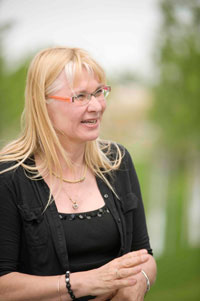A Summer Filled with National Security-related Science
sue@susanweaver.net
Mix a senior chemical engineering student with some solid undergraduate research experience, good grades, and a passion for what she does, and you may not get a chemical reaction, but you will get a great candidate for a competitive internship program.

Kelly Fitzgerald has been selected as one of approximately 30 students in the U.S. to participate in the Pacific Northwest National Laboratory (PNNL)’s National Security Internship Program this summer.
PNNL, located in Richland, WA, is one of the Department of Energy’s ten national laboratories. The internship program provides the opportunity for students to participate in national security-related science. Fitzgerald will spend the summer working in the radio chemistry department, where she is expecting to work in computer modeling and electro-chemistry.
Fitzgerald learned about the internship from her chemistry professor, Sue Clark, and applied.
The two major benefits of the program are the possibility for tuition reimbursement and a great networking experience, she said.
Fitzgerald has been active in undergraduate research since her sophomore year, working in the lab with Clark, as well as with graduate and post-doctoral students.
“This really helped me get the internship because it gave me a lot of experience in a lab,” she said.
Fitzgerald hasn’t always been interested in chemical engineering, but her classes at WSU led her to her current career choice.
“My dad is a nuclear engineer, so I knew about engineering as an option early on,” she said. “I started out in bioengineering, but after taking two courses in chemical engineering, I realized I was much more interested in that.”
After completing her internship and her undergraduate studies, Fitzgerald is considering graduate school, possibly at WSU.
“I think I have the resources here where I could really excel in the program,” she said.
Although a little nervous about surviving the heat in the Tri-Cities all summer long, Fitzgerald said she is extremely excited for the internship.
“I’m excited to finally be in a work environment instead of just in the student role,” she said. “I can’t wait to do the work I’ve chosen as the career for the rest of my life.”
